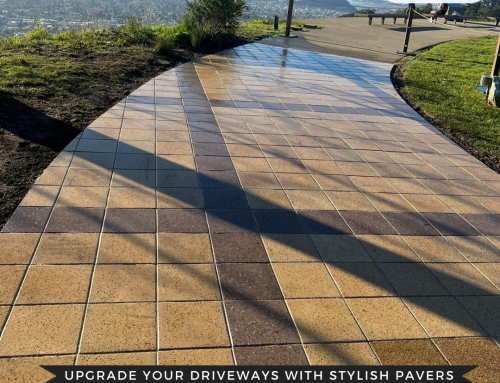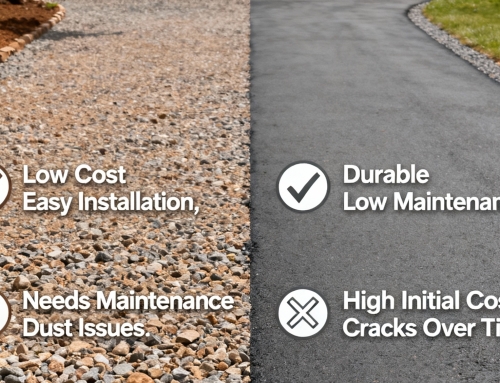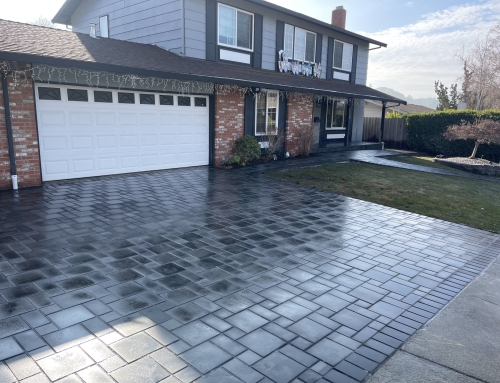When it comes to outdoor spaces, paving is a critical component that ties your landscape together, adding both beauty and function. But with so many options available, it’s easy to get overwhelmed. Whether you’re designing a driveway, patio, walkway, or any hardscape feature, two things often come up: concrete paving and the expertise of paving contractors.
This guide dives deep into concrete paving, its materials, the durability of pavers, and why hiring professional paving contractors is essential. We’ll also answer some of the most common questions: Are pavers made of concrete or cement? and Do pavers crack easily?
The Importance of Concrete Paving in Landscaping
Before we dig into the specifics, let’s start with the basics: what is concrete paving, and why should you consider it for your outdoor projects?
Concrete paving is one of the most popular choices for driveways, walkways, patios, and pool decks. It provides a durable, long-lasting surface that can withstand heavy traffic and the elements. Plus, it offers a clean, modern look that enhances curb appeal. However, concrete isn’t a one-size-fits-all material; there are many types of pavers available, including those made from cement, clay, natural stone, and permeable materials.
Professional paving contractors can help you navigate these choices, ensuring you get the best option for your needs.
Are Pavers Made of Concrete or Cement?
Here’s the thing: cement is an ingredient of concrete, not a material on its own.
Cement is a fine powder made from limestone and other minerals. When mixed with water and aggregates (like sand or gravel), it forms concrete. Concrete is what’s poured or molded to create pavers.
Why is this distinction important?
Understanding the difference helps you choose the right materials for your project. Cement is a component of the mix, but it’s the combination of cement, water, and aggregates that make concrete pavers so strong and versatile.
Different Types of Pavers:
- Concrete Pavers: Concrete pavers are pre-made blocks designed to resemble stone, brick, or other natural materials. They’re incredibly popular because they’re durable, versatile, and available in a range of colors and textures.
- Clay Pavers: These pavers are made from natural clay that’s baked in a kiln. While they offer a classic look, they’re less versatile than concrete and often more expensive.
- Natural Stone Pavers: Stone pavers are quarried from the earth and cut into shape. They offer a more natural look but can be costly and require professional installation.
- Permeable Pavers: These pavers are designed to allow water to flow through, making them an eco-friendly option for areas prone to flooding or requiring stormwater management.
Of these, concrete pavers are often the most popular choice due to their cost-effectiveness, durability, and versatility in design.
Do Pavers Crack Easily?
Cracking is a major concern for any homeowner investing in a new patio, driveway, or walkway. No one wants to deal with broken pavers or an uneven surface after a few years. So, do concrete pavers crack easily?
Cracking usually occurs when pavers aren’t laid properly or if the ground beneath them isn’t prepared adequately. A professional paving contractor knows how to avoid these issues by taking essential steps, like compacting the soil, ensuring proper drainage, and using quality materials.
Here’s why that matters:
- Foundation: The foundation, or subgrade, is critical to preventing cracks. A weak foundation can lead to shifting and sinking, which in turn causes pavers to crack. Proper excavation and the addition of a gravel base help prevent this.
- Quality of Pavers: High-quality concrete pavers are designed to resist cracking and can last for decades. Opting for cheaper materials may save money upfront, but they’ll likely need repairs or replacement sooner.
- Joint Sand: After the pavers are laid, joint sand is used to lock them in place. This sand helps distribute the weight evenly and prevents movement, which reduces the likelihood of cracks.
- Drainage: Poor drainage can cause water to pool under the pavers, leading to cracks over time. Paving contractors ensure that water flows away from your paved surface to avoid this issue.
The bottom line: while pavers can crack, this is usually a result of poor installation, not the material itself. That’s why hiring professional paving contractors is essential to ensure a smooth, long-lasting finish.
Why You Need a Professional Paving Contractor
While DIY projects can be fun and cost-saving in some cases, paving is not the type of project you want to handle on your own—especially when you’re investing in a large surface like a driveway or patio. Here’s why hiring a professional paving contractor is the smarter choice:
1. Expertise in Material Selection
A paving contractor knows the differences between concrete, clay, and natural stone pavers. They can recommend the right material based on your needs, the climate in your area, and your budget.
2. Proper Installation Techniques
Paving requires precision. If the ground isn’t excavated properly or the pavers aren’t laid with exact spacing, you’ll end up with an uneven surface, cracks, or shifting pavers. A professional will ensure that the foundation is compact, the pavers are spaced correctly, and that the joint sand is applied to lock everything in place.
3. Long-Term Durability
The durability of your paving job is directly tied to the contractor’s skills. A properly installed surface can last decades without needing repairs. In contrast, a poorly executed job could start showing cracks and shifting after just a few years.
4. Efficient Drainage Solutions
Drainage is crucial to the long-term stability of your paved surface. If water doesn’t drain properly, it can lead to erosion, cracks, and even damage to the foundation of your home. Professional contractors ensure that your paved areas have proper slope and drainage systems to prevent these issues.
5. Warranty and Guarantees
Reputable paving contractors typically offer warranties on their work. This means if something does go wrong, they’ll fix it without additional costs. DIYers don’t have this luxury, leaving them to shoulder the costs of repairs or replacements.
The Cost of Concrete Paving vs. Other Materials
Cost is often a deciding factor when it comes to choosing materials. So, how does concrete paving compare to other options like asphalt or natural stone?
1. Concrete vs. Asphalt:
Concrete paving is more expensive than asphalt, but it’s also more durable and requires less maintenance. Asphalt may need to be resealed every few years, while concrete can last decades without much attention.
2. Concrete vs. Natural Stone:
Natural stone is more expensive than concrete and usually requires a more skilled installation. While stone pavers offer a beautiful, organic look, they’re not as cost-effective as concrete.
3. Concrete vs. Clay:
Clay pavers tend to be more expensive than concrete but are known for their rich color and texture. However, they’re less versatile than concrete when it comes to design options.
Choosing the Right Paving Contractors
Now that we’ve covered the importance of concrete paving and its durability, how do you choose the right paving contractor?
Here are a few things to look for:
- Experience: How long have they been in business? Do they have experience with the specific type of project you’re planning?
- Portfolio: A reputable contractor should have a portfolio of previous work that showcases their skills.
- Reviews and Testimonials: Customer reviews can give you insight into the contractor’s reliability and quality of work.
- Licensing and Insurance: Make sure the contractor is licensed and insured. This protects both you and them in case of accidents or issues during the project.
By carefully selecting a professional contractor, you’ll ensure that your project is completed on time, within budget, and to the highest standards.
Conclusion
Concrete paving offers a versatile, durable, and cost-effective option for your outdoor spaces, whether it’s a driveway, patio, or walkway. Understanding the differences between pavers and cement, the importance of proper installation, and why cracks happen (or don’t) is key to making informed decisions.
Hiring a skilled paving contractor ensures that your project stands the test of time, remains visually appealing, and functions well for years to come. After all, when it comes to paving, cutting corners on installation or materials is a decision you’ll regret.







